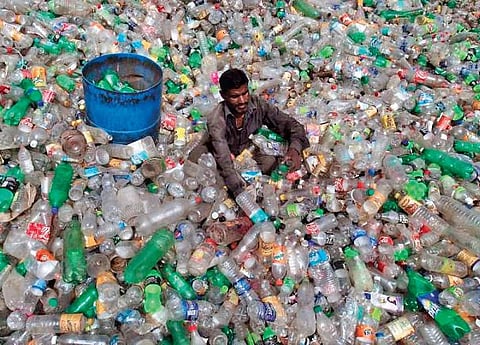

NEW DELHI: The National Green Tribunal Monday directed the Centre and other agencies to take action within three months on a report by an expert committee which sought ban on small water bottles, pouches and cups saying these constitute a considerable amount of plastic waste.
A bench headed by NGT Chairperson Justice Adarsh Kumar Goel said that based on the recommendations of the expert committee, "the Ministry of Environment and Forests, Directorate General of Health Services, Food Safety and Standards Authority of India and other agencies concerned shall take action within three months in accordance with law".
The report, submitted recently by the panel, has stated that lighter, portable, and cost-effective nature of single serve "sachets/pouches/bottles" continues to make them an attractive proposition for the low-income consumers as well as young and active millennials.
"Smaller pack sizes/single serve packaging also have brought better quality and premium products affordable to all the sections of the society.
But on the other hand it constitutes to the major plastic waste and litter, as their collection is economically non-viable.
Hence, in consultation with Legal Metrology Department the small pack sizes such as small water bottles, pouches, cups which constitute a considerable amount of plastic waste may not be allowed," the panel said.
During its deliberation, the expert committee noted that food and beverages, drugs and cosmetics and textiles are major items of mass consumption that use plastic packaging.
"All municipal bodies must be made responsible for development and setting up of infrastructure for segregation, collection, storage, transportation, processing and disposal of the plastic waste either on its own or by engaging agencies or producers as mentioned in the Plastic Waste Management Rules.
"Citizens, especially the socially engaged ones living in urban areas with wide access to information, have adopted more environmentally conscious consumption habits oriented toward recycling, reusing and composting the waste that derives from their domestic consumption," the report said.
The Expert Committee noted that while regulatory provisions for restrictions on the packaging by use of plastic material are mostly in place, there is lack of coordinated approach and implementation of these provisions is poor.
The tribunal had in May set up an expert committee to probe whether there is a need for further norms to restrict plastic packaging of food products after a plea has sought a ban on it citing health and environment concerns.
The panel comprised representatives of Food Safety and Standards Authority of India, Bureau of Indian Standards, Central Pollution Control Board and Directorate General of Health Services.
NGT was hearing a petition filed by NGO Him Jagriti Uttaranchal Welfare Society seeking ban on the use of plastic bottle and multi-layered/plastic packages /pet bottles.
Use of plastics, including polyethylene terephthalate (PET) bottles and multi-layered packs such as Tetra Packs, has an adverse impact on health and environment, the plea said, adding that it also results in increase in plastic waste.
It had said the notification dated December 24, 2018, issued by the Ministry of Health and Family Welfare under Section 92 of Food Safety and Standards Act, 2006 deals with the issue of packaging mode of food but it ignores Antimony and Di-2-ethylhexyl phthalate (DEHP) in specific migration limits provided for plastic packaging.